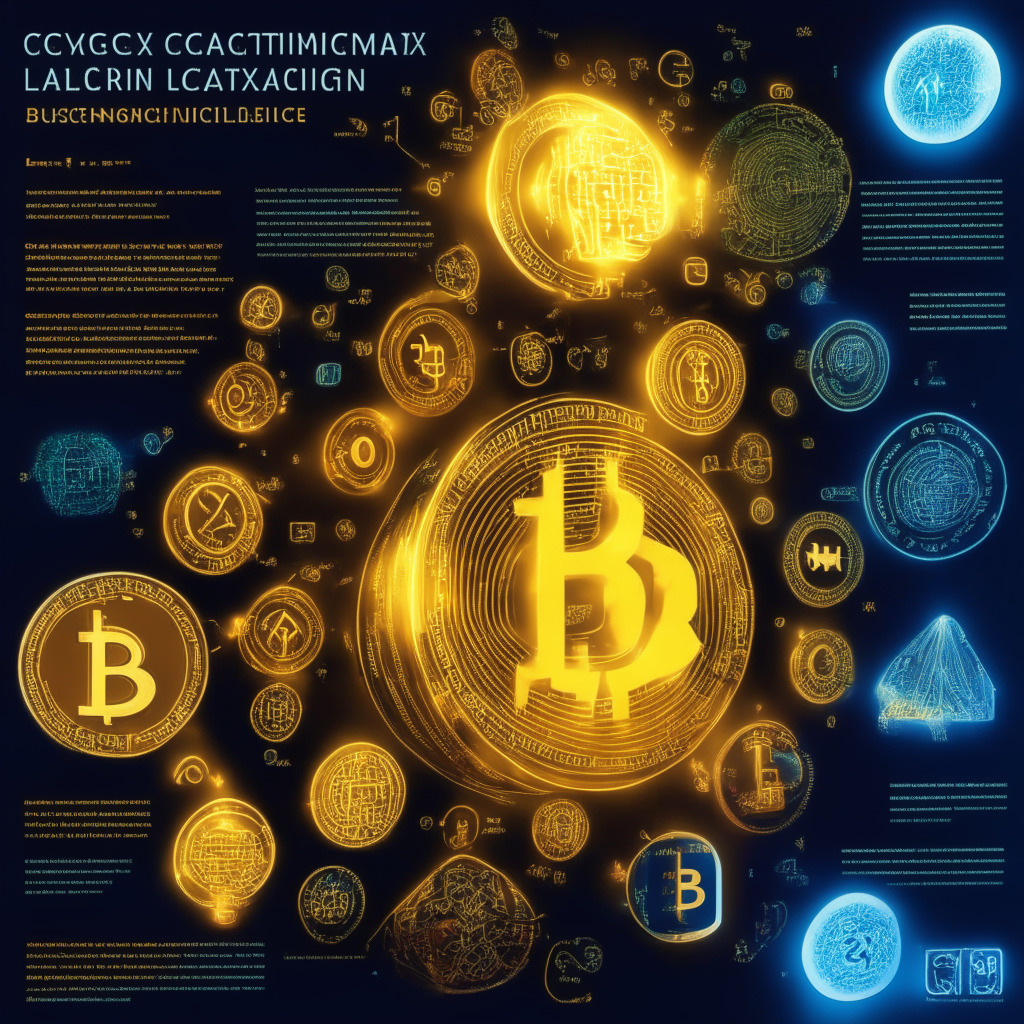The SEC filed a lawsuit against Binance for allegedly violating federal securities laws, resulting in a decline of over 20% in top altcoins. Despite market unrest, experts still view Bitcoin and Ethereum as safer investment options. The outcomes of these lawsuits may influence future crypto regulations.
Search Results for: Global Coin Research
Binance’s Legal Issues: A Blessing in Disguise for Coinbase and Crypto Market? Pros and Cons
Ark Investments founder Cathie Wood claims that Binance’s legal issues in the US could be favorable for Coinbase, as it eradicates competition. Wood believes increased regulatory scrutiny on Binance will ultimately benefit Coinbase in the long term.
Altcoin Sell-off vs. Bitcoin Stability: Regulatory and Economic Impacts on Crypto Market
The altcoin market faces a sell-off as major cryptocurrencies undergo scrutiny in the U.S., while BTC remains stable. The SEC lawsuits against Binance and Coinbase led to declines in BNB, ADA, MATIC, and SOL, whereas BTC consolidated its position. This indicates an emerging divide between established cryptocurrencies and newer alternatives amid regulatory concerns and economic shifts.
Top Cryptos to Invest Amidst Coinbase and Binance Legal Battles
The SEC has accused Coinbase of operating illegally without registration, raising questions about the best cryptos to invest in. Despite legal battles, the market remains resilient, with promising cryptocurrencies like WSM, BGB, ECOTERRA, QNT, YPRED, KAVA, and DLANCE gaining attention. Regulatory scrutiny highlights the importance of staying informed and making well-researched investment decisions.
Two-Year Countdown to Regulate AI: Risks, Challenges, and the Race for Global Control
AI task force advisor, Matt Clifford, warns that humanity has about two years to regulate and control AI before it becomes too powerful, posing existential risks. He suggests focusing on understanding AI models and implementing global regulations, emphasizing the importance of addressing potential dangers and harnessing AI’s potential responsibly.
Asian Markets Rally Amid Fed Expectations: How Bitcoin Navigates Inflation and Volatility
Asian stock markets rally amid anticipation of the US Federal Reserve holding off on interest rate hikes, while Bitcoin trades below $27,000. Inflation concerns may lead to a surge in Bitcoin value as a safe haven. Investors should conduct thorough research before entering the volatile cryptocurrency market.
US Debt Ceiling Bill Impact on Crypto and Global Economy: What to Watch
The US debt ceiling bill’s passage has averted economic catastrophe for now, with focus shifting to the US economy outlook, recession risk, and future Federal Reserve moves. Meanwhile, ECB President Christine Lagarde hints at another rate hike amid Eurozone inflation concerns. Stay informed and conduct thorough market research before making investment decisions in cryptocurrencies or financial assets.
FedNow vs Stablecoins: 5 Key Advantages Keeping Decentralized Assets Relevant
Stablecoins maintain relevance despite the launch of FedNow, offering advantages like global accessibility, financial inclusivity, on-chain transactions, affordable cross-border payments, and handling unrestricted transaction sizes, making them essential in the crypto ecosystem.
Tether’s USDT Reclaims All-Time High Market Cap Amid Stablecoin Controversy and Competition
Tether’s stablecoin USDT has regained its all-time high market cap of $83.2 billion, despite challenges in the stablecoin market and criticism over its reserve transparency. USDT’s perceived safety from U.S. regulators and its growing use for global payments contribute to this resurgence, highlighting peg stability as a priority for users.
Hong Kong Crypto Regulations and IRS Access to Coinbase Data: Impact on Bitcoin Market
Bitcoin’s price tumbled 2% amid Hong Kong’s crypto regulatory regime launch and other factors such as macro, technical, and regulatory challenges. Investors have been offloading and moving Bitcoin off Coinbase, affecting the market alongside global economic developments like the US debt ceiling deal and interest rate discussions.
Debt Ceiling Turmoil: Eroding Trust in USD and Bitcoin’s Journey as Safe-Haven Asset
Blackrock CEO Laurence Fink suggests that the US debt ceiling turmoil has eroded global trust in the dollar, potentially benefiting Bitcoin as a hedge against inflation and debt. Market analysts note Bitcoin’s utility as a finite-supply safe-haven asset, but caution that its future value remains uncertain due to market factors and ongoing events.
Bitcoin’s First Monthly Loss of 2023: Analyzing the Whales’ Impact and Market Uncertainty
As Bitcoin faces its first monthly loss in 2023, market uncertainty increases with whales moving nearly 16,000 BTC across exchanges. This could impact the market adversely, and amid economic issues, investors should be cautious and conduct proper research before venturing into cryptocurrency investments.
Yuan Depreciation vs Dollar Strength: Impact on Bitcoin and Global Crypto Markets
China’s yuan (CNY) experienced a 2.7% depreciation against the U.S. dollar (USD) this month, historically considered bullish for alternative assets like bitcoin and gold. However, the strengthening U.S. dollar could lead to continued monetary tightening worldwide, posing a headwind for risk assets, including cryptocurrencies.
Binance CEO on Lightning Network, Mining, and Global Crypto Regulations
Binance CEO Changpeng “CZ” Zhao discusses the importance of Lightning Network integration for crypto exchanges, mining operations, regulatory challenges, and the need for investors to research before investing in meme coins, NFTs, or metaverse projects. Favorable crypto regulations cited in UAE and Hong Kong.
The Shaky Future of Bitcoin: Examining Market Fluctuations, Adoption, and Crypto Utility
Bitcoin faces a 6.5% monthly drop but maintains a 68% year-to-date gain. To attract more investment, real utility and development must be demonstrated, according to John Wu, president of Ava Labs Inc. Increased network activity, including BRC20 standard Bitcoin Ordinals and NFTs, has impacted transaction fees and network congestion.
Bitcoin Outshines Gold and Oil: Pros, Cons, and Market Fluctuations Unveiled
Bitcoin outperformed major commodities like Crude Oil and Gold over the past 90 days, gaining over 15% in value despite global financial market fluctuations. The increasing number of non-zero Bitcoin addresses and exchange deposit lows suggest a growing interest in holding the cryptocurrency, although caution about market fluctuations should still be exercised.
Bear Market Fears Loom: How Stock Market Crash Might Affect Bitcoin and Crypto World
Market expert John Hussman raises concerns about a potential bear market, citing overvalued stocks and poor investor sentiment. This bearish outlook may affect the crypto market, with some experts predicting Bitcoin’s price to plummet and warnings against purchasing cryptocurrencies in the uncertain climate.
Crypto Sentiment Research Threatened: Decoding Twitter’s $42,000 Decahose Fee and Its Impact
Twitter’s recent $42,000 monthly fee for Decahose data service access raises concerns for the crypto research community. This change could hinder global research efforts, restricting crucial information on topics like internet-related crimes and cryptocurrency sentiment research, potentially impacting the crypto ecosystem’s future.
The Orb: Unveiling Worldcoin’s Controversial Iris Scanning Crypto Project
OpenAI CEO Sam Altman’s Worldcoin project aims to create a global ID, currency, and a crypto payment app, raising concerns and skepticism over its biometric data requirement. With The Orb as its central tool, Worldcoin recently raised $115 million in Series C round, garnering investor enthusiasm despite the concerns.
Cryptocurrency Market Uncertainty: Time to Buy Altcoins or Brace for Volatility?
The cryptocurrency market faces uncertainty and selling pressure, especially for Bitcoin and top altcoins. Hesitation may present an opportunity to accumulate underbought altcoins, one year away from the next halving event. Investors should conduct thorough research, considering market volatility.
US Debt Default Threat: Implications for Bitcoin, Ethereum, and Global Crypto Market
The U.S. risks its first-ever debt default, potentially impacting global markets and cryptocurrencies, including Bitcoin and Ethereum. Cryptocurrency markets face uncertainty, and the larger question is whether lawmakers can find a permanent solution to ease financial market tensions.
Floki Inu & PEPE Coin: Memecoin Comeback and the Influence of Strategic Partnerships
The Floki project has announced a strategic partnership with DWF Labs, a prominent Web3 investment company, driving the adoption of Floki and paving the way for its ecosystem’s development. This collaboration marks a critical juncture for Floki, which aims to outpace Dogecoin and Shiba Inu in becoming the most widely used memecoin.
Will Bitcoin Follow NVIDIA’s Surge? Analyzing the Inverse Head and Shoulders Pattern
Amid debt ceiling talks and market confusion, Bitcoin remains under selling pressure while experts predict a potential surge mirroring NVIDIA’s recent 27% increase. By examining an Inverse Head and Shoulders (iHS) pattern, investors are urged to approach these predictions cautiously and conduct thorough market research before investing.
Worldcoin’s Iris Scanning: Ensuring Uniqueness or Compromising Privacy?
OpenAI CEO Sam Altman has secured $115 million in Series C funding for Worldcoin, a cryptocurrency project focused on the Worldcoin token and decentralized World ID. The project aims to distribute tokens based on individuals’ unique statuses, using iris scans for identity verification. However, privacy concerns and potential safety risks have drawn criticism.
Worldcoin’s Astonishing $115M Funding Round: Opportunities, Risks, and the Crypto Black Market
Worldcoin, a decentralized open-source protocol co-founded by OpenAI CEO Sam Altman, recently raised $115 million in a Series C funding round led by Blockchain Capital. The project focuses on the World ID and Worldcoin token, aiming to revolutionize the crypto ecosystem while addressing user security and privacy concerns.
Raising $115M for New Anti-Bot Tech and UBI: Worldcoin’s Bold Vision Faces Privacy Concerns
Tools for Humanity has raised $115 million in series C funding for projects including an alternative to the CAPTCHA test and the Worldcoin project. The company aims to create efficient bot detection methods while addressing concerns over privacy in their “Proof of Personhood” retina scan verification process.
Bearish Bitcoin Outlook: Analyzing Peter Brandt’s Prediction Amid US Debt Crisis
Renowned trader Peter Brandt recently shared a bearish outlook on Bitcoin, pointing to a chart pattern known as a pennant or flag. Bitcoin’s ongoing consolidation and uncertainties surrounding US debt ceiling talks contribute to the overall cautious sentiment.
Global Crypto Regulation: Analyzing IOSCO’s Recommendations and The Future of the Industry
The International Organization of Securities Commissions (IOSCO) has released a report proposing 18 recommendations for global crypto regulation, covering areas like conflicts of interest, cross-border risks, and market manipulation. Public consultation on these recommendations is open until July 31, potentially shaping the future of cryptocurrency regulation worldwide.
MicroStrategy’s Bitcoin Investment: Fair Value Accounting & Cryptocurrency Adoption Debated
MicroStrategy Inc, the largest public company holder of Bitcoin, supports fair value accounting for cryptocurrencies, demonstrating faith in digital assets’ long-term potential. However, critics argue that the volatile nature of crypto may render fair value accounting unreliable, and market participants must address potential challenges associated with such investments for sustainable blockchain industry growth.
Predicting Bitcoin’s Fate Amid US Debt Ceiling Crisis: Expert Insights and Market Dynamics
Legendary trader Peter Brandt predicts potential Bitcoin price downfall amid U.S. debt ceiling dilemma and market volatility. Despite being bullish on a $40,000 target, bearish sentiment increases. Brandt, known for accurate past analyses, warns against dismissing downside risks and overconfidence in price predictions.
MetaMask Tax Clause: Unraveling Applicability and Global Crypto Tax Policies
The MetaMask tax clause only applies to users who purchase products or services from the wallet service provider, not those using it as a crypto wallet for non-commercial purposes. Accointing clarifies that the tax pertains to the sale of services between users and MetaMask, with the service provider responsible for settling tax payments.
US Debt Ceiling Crisis: A Potential Bitcoin Surge or Temporary Crash?
The US debt ceiling crisis could potentially cause a surge in Bitcoin’s price, as investors search for alternatives amidst stock market destabilization. Traditional finance investors may view Bitcoin as a safe haven during these uncertain times, with predictions of significant price increases.































